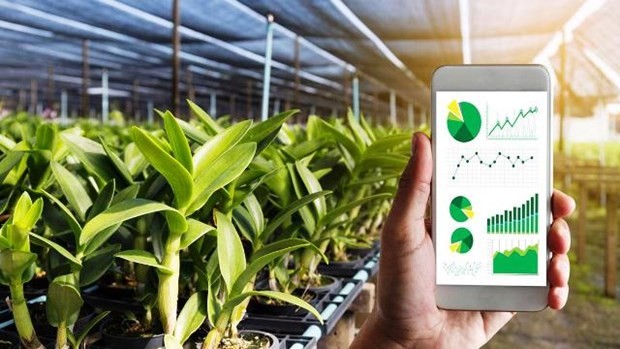(VOVWORLD) - Digital transformation, a trend which has been accelerated by the coronavirus pandemic, is helping farms, cooperatives, and agricultural businesses increase their productivity and improve the quality of their produce. Economists believe it will help Vietnam’s agricultural sector cut production costs, increase profits, and participate more actively in the global value chain.
 Amid challenges from climate change and pandemic, the digital transformation in agriculture and agricultural management is expected to help boost the sector’s growth through better market forecast and planning. (Photo: baodantoc.vn) Amid challenges from climate change and pandemic, the digital transformation in agriculture and agricultural management is expected to help boost the sector’s growth through better market forecast and planning. (Photo: baodantoc.vn)
|
The Vietnam Administration of Forestry has been assigned to manage 16.2 million hectares nationwide, including 14.4 million hectares of forest land and 1.8 million hectares of non-forest land. 1,900 State organizations, as forest owners, and 250,000 households are benefiting from payments for forest environmental services on 6.5 million hectares.
Pham Van Dien, Deputy Director of the Vietnam Administration of Forestry, said the forest land allocated to forest owners is scattered and fragmented.
Without digital technology, it would be impossible to pay the many forest beneficiaries who manage the forest land in remote, mountain areas.
Dien said the forestry industry has developed an information system with access to each forest plot, adding, “This is only the first step in the digital transformation process. There remain many other tasks such as digitizing and integrating databases. Most importantly, the system should be user-friendly. Next we’ll improve the database and make it more useful.”
The forestry sector is starting to benefit from the same digital transformation which has brought positive results to farming, animal husbandry, and aquaculture.
The global COVID-19 crisis is motivating the agricultural sector to speed up digital transformation so it can continue to sustain the national economy during and after the pandemic.
That will require good planning from central to local level, and support from the digital business community, says Le Tan Phong, Deputy Director of Lao Cai Department of Agriculture and Rural Development.
“If every locality hires a consulting company and uses their software, a lot of that effort will go to waste when it’s time to unify the whole country around one comprehensive software solution. We need to decide on a shared development direction, identify key tasks, and create a roadmap to coordinate action plans at every level,” said Phong.
Phung Duc Tien, Deputy Minister of the Ministry of Agriculture and Rural Development, said that digital transformation is important for agriculture not only because applying technology creates added value, but because it will give tens of millions of farmers better information and encourage new ways of thinking and acting that will allow farming to keep up with national development.
According to Tien, “Digital transformation in agriculture and rural development is the key to producing agricultural products at the lowest possible cost and selling them at the highest possible price. Digital transformation is not just an improvement but a replacement of old methods.”
He added, “Every step needs to be taken cautiously because Vietnam’s agriculture sector has limited resources. Everything needs to be coordinated at each stage. Everyone must know what needs to be done first, which technology needs to be applied first, to avoid confusion and chaos.”
Nguyen Duy Hung, Deputy Head of the Party Central Committee’s Economic Commission, stressed the importance of seizing the opportunities of the Fourth Industrial Revolution and encouraging innovation in high-tech agriculture, smart agriculture, organic agriculture, biotechnology, and development of rural industry and services to boost digital transformation in agriculture.
Hung also urged that laws and policies on digital transformation in line with the socialist-oriented market economy be instituted and qualified human resources be trained.
“All participants in the digital transformation from policy makers to individual citizens, businesses, and research institutes need to work closely with one another. Basic data on soil, climate, livestock, and crops is extremely important for rural agriculture,” said Hung.
August 19th is observed annually as Digital Agriculture Transformation Day, a day dedicated to raising people’s awareness of the mission, necessity, and urgency of digital transformation in agriculture and rural development, and calling for comprehensive action at all levels to complete the national digital transformation program.